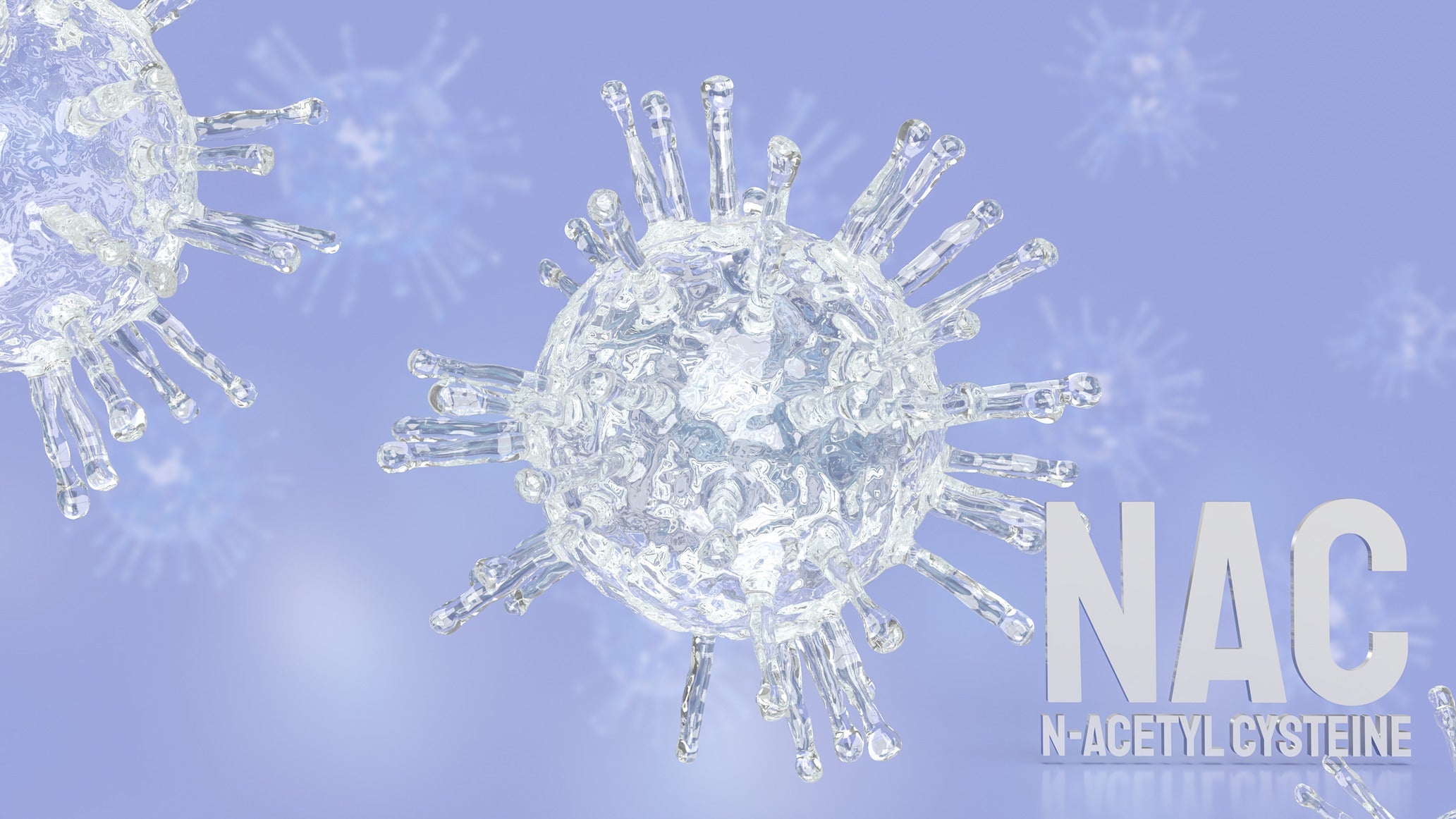
N-acetyl L- Cysteine (NAC) - The All-rounder Supplement
N-Acetyl L-Cysteine is a powerful and versatile nutritional supplement that can immensely benefit a person’s health. It is a unique one in the bunch – jack of all trades and master of some! NAC is converted to L-Cysteine in your body, which is a semi-essential amino acid. Amino acids are building blocks of proteins, and semi-essential means they tend to run low during infancy and times of illness or injury.
How does your body create cysteine? Cysteine is made from two other amino acids, serine and homocysteine, a breakdown product of methionine (essential amino acid). Some food sources that are rich in methionine and serine are turkey, chicken, cheese, yogurt, eggs, legumes and sunflower seeds.
Your body needs an ample amount of folate, vitamin B6 and B12 to support the production of cysteine from methionine and serine. Cysteine is also directly found in many high-protein foods including braised lamb, chicken breast, cottage cheese, ricotta and more.
Cysteine is a precursor for the master antioxidant glutathione that helps fight free radicals that can cause cell damage. Glutathione is involved in tissue building and repair, making chemicals and proteins needed in the body, and in immune system function. When NAC is taken as a supplement, your body makes it into cysteine and then into glutathione.

Uses and benefits of NAC
-
The master antioxidant
NAC works with amino acids glycine and glutamine to make and replenish your body’s master antioxidant glutathione. Antioxidants are compounds that fight against free radicals that damage DNA, cell membranes and other cell parts due to oxidative stress and toxins. Glutathione is helpful to remove and detoxify carcinogens that promote formation of cancer, it is also beneficial for people with non-alcoholic fatty liver disease (NAFLD), promotes longevity and keeps your immune system strong.
-
May help with symptoms of certain viral infections
A large study conducted on COVID-19 patients who were given high doses of NAC along with the standard COVID-19 treatment protocol showed better improvement when compared to standard treatment alone. The patients were old and also had several comorbidities.
Another small study from Greece found that NAC supplementation of a total of 1200 milligrams per day lessened the risk of mechanical ventilation and mortality in patients with COVID-19.
-
May help improve some mental disorders
There is a growing interest in the use of NAC for treating the symptoms of several psychiatric disorders like substance abuse, autism, obsessive-compulsive spectrum disorders, schizophrenia, depression and bipolar disorder.
NAC helps to regulate glutamate levels. The right amount of glutamate - not more or less - is required for normal brain functioning. Glutamate is a chemical messenger of the most abundant free amino acid in the brain and it also influences dopamine levels. For this reason, NAC can help with brain health in general as glutamate is important for several brain functions such as learning, behavior, and memory.
-
May help with fertility-related issues
Testosterone is often elevated in women with PCOS (polycystic ovary syndrome) which can lead to symptoms like acne, facial hair and hair loss. A study that gave NAC supplements to women with PCOS recorded decreased testosterone levels and increased follicle stimulating hormone levels in the patients, thus improving the functioning of their reproductive system. NAC may also help combat low sperm counts in males due to its antioxidant effects.
-
May protect the heart
Oxidative stress is a major factor that can cause heart issues. Some studies suggest supplementing with NAC may reduce the risk of heart attack in people with diabetes by resisting oxidative stress. Another study associated it with reduced blood pressure and low homocysteine levels. High levels of homocysteine can help one catch early development of heart disease.
NAC also induces production of nitric oxide that helps to dilate veins and increase the flow of blood to your heart, thus reducing the risk of heart attacks.
-
May help with respiratory issues
Since NAC acts as an antioxidant due to glutathione, it may also help patients with Chronic Obstructive Pulmonary Disorder (COPD) and chronic bronchitis. People with these issues have chronically inflamed lungs and airways that lead to symptoms like excess coughing and difficulty in breathing. It reduces inflammation in the lungs and the airways by replenishing glutathione levels in your lungs; this loosens up the mucus in the airways. Some other respiratory conditions it may be beneficial for include asthma, pulmonary fibrosis, cystic fibrosis, and allergies that cause nasal and sinus congestion.
FDA Controversy
NAC was caught in controversy as the FDA (U.S. Food and Drug administration) tried to ban it in 2022, claiming it to be a pharmaceutical ingredient mislabeled as a supplement. NAC was approved in 1963 as an inhaled drug for obstructive lung disease and then again in 1985 as an oral agent to treat paracetamol toxicity. For these reasons they claim it does not come under dietary supplements.
Conclusion
After seeing the long list of benefits, if you are looking to supplement with NAC for any condition, make sure to research well and consult a trusted medical practitioner or nutritionist. It is important to be clear about the purpose for which you would be taking the supplement to determine the dose. Look for quality supplements without any additives that will be safe to use.
REFERENCES:
1. 9 Benefits of NAC (N-Acetyl Cysteine): The ‘Do-It-All Supplement’ You’ve Never Heard Of: The Hearty Soul.
https://theheartysoul.com/nac-n-acetyl-cysteine-benefits/
2. Biosynthesis of Cysteine: National Library of Medicine https://pubmed.ncbi.nlm.nih.gov/26443742/
3. Conformational perturbation of SARS-CoV-2 spike protein using N-acetyl cysteine: an exploration of probable mechanism of action to combat COVID-19: Taylor & Francis Online
https://www.tandfonline.com/doi/abs/10.1080/07391102.2023.2234031
4. Cysteine Metabolism: ScienceDirect https://www.sciencedirect.com/topics/agricultural-and-biological-sciences/cysteine-metabolism
5. NAC (N-Acetyl Cysteine) Supplement: Benefits, Side Effects, Uses & Recommendations: Good Housekeeping. https://www.goodhousekeeping.com/health/diet-nutrition/a44591291/nac-supplement-benefits/
6. N-Acetyl Cysteine Functions as a Fast-Acting Antioxidant by Triggering Intracellular H2S and Sulfane Sulfur Production: Cell Chemical Biology https://www.cell.com/cell-chemical-biology/fulltext/S2451-9456(18)30033-3
7. N-ACETYL CYSTEINE: RxList
https://www.rxlist.com/n-acetyl_cysteine/supplements.htm
8. NAC Supplements Could be Banned Unless FDA Reverses Course: Nutraceuticals world. https://www.nutraceuticalsworld.com/issues/2022-03/view_columns/nac-supplements-could-be-banned-unless-fda-reverses-course/
9. N-Acetylcysteine for Polycystic Ovary Syndrome: A Systematic Review and Meta-Analysis of Randomized Controlled Clinical Trials: National Library of Medicine
https://www.ncbi.nlm.nih.gov/pmc/articles/PMC4306416/
10. N-acetylcysteine in the treatment of psychiatric disorders: current status and future prospects: National Library of Medicine
https://pubmed.ncbi.nlm.nih.gov/27766914/
11. Oral N-acetylcysteine reduces plasma homocysteine concentrations regardless of lipid or smoking status: Science Direct
https://www.sciencedirect.com/science/article/pii/S0002916523137397?via%3Dihub
12. The Antioxidant Role of Glutathione and N-Acetyl-Cysteine Supplements and Exercise-Induced Oxidative Stress: National Library of Medicine https://www.ncbi.nlm.nih.gov/pmc/articles/PMC2129149/
13. The effect of oral N-acetylcysteine in chronic bronchitis: a quantitative systematic review: European Respiratory Journal
https://erj.ersjournals.com/content/16/2/253.short
14. What are the Health Benefits of NAC? (N-Acetyl Cysteine): Healthline



1 comment
This article does a fantastic job of highlighting the many benefits of NAC and its role as a powerful antioxidant. The breakdown of how NAC supports different bodily functions—from mental health to heart health and fertility—is particularly insightful. The inclusion of scientific studies adds credibility, making it a valuable read for anyone considering NAC supplementation. A suggestion would be to include potential side effects or interactions with medications to provide a more balanced perspective. Overall, an informative and well-researched piece!
https://just-glow.com/collections/nmn-supplements
Just Glow
Leave a comment
This site is protected by hCaptcha and the hCaptcha Privacy Policy and Terms of Service apply.